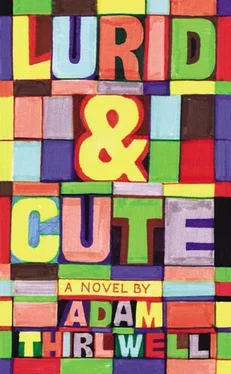— Don’t be crazy, she said.
But of course it was not the words but the tone in which she said it, this flat thing where nothing was emphasised, that was what made me so terrified for what had happened, as if in that flatness there was so much knowledge about the world but in particular about me. As she took off her vest and stood there topless in her jeans so that her breasts were there, I looked at them and understood that never again would I know that beauty, because it was nothing to do with the physical breasts themselves but to do with the entire situation, this situation in which a goofy clown understood what precisely he has lost. For I would say: the basic moral problem is that quite obviously we are more than one person, and throughout our lives so many of my friends are ruthless to the alternatives, to the other options and arrays of Wyman and so on that they do not wish to bring into life. But why not? Why does the Wyman who is a drug addict not get owed as much as the Wyman who is a paralegal? Why should the paralegal be the only Wyman who is adored? When I feel guilt it is all for the things undone, the things I do not do. To which the only possible response is what Candy would say and it is one reason why I loved her. That there is no logical reason not to do everything, sure, and therefore if we take the matter of for instance sleeping with the girl in the cream tuxedo and leather trousers sucking suggestively on a bottle of beer, the only reason not to go into the dark bedroom light with her is no reason at all, but also it is everything — that in the manner of the most superfluous and beautiful artwork you have decided to say to yourself that you will not ever do this, and that is in fact a binding and wonderful place to be. For it is wonderful, the state of being bound. Except now I was not bound at all.
— I’m not sure we should fuck, I said.
— I don’t care, she said.
— Stop saying you don’t care! I said.
— I’m sorry, she said. — What do you want me to say?
But I did not know what I wanted her to say. I was remembering a little speech that Candy had once given, where she at some drunken point announced that her life was basically always the same thing. When she couldn’t do anything, she was unhappy; when she could do something she was unhappy because there wasn’t enough time to do it; and when she thought about doing something in the future, which should presumably give her some hope, she was then devastated by fear, giant and encompassing fear. That doesn’t mean, of course , she then added, that there aren’t good moments . I missed the speech of Candy very much. Outside it was the usual overcast atmosphere: the taste of ashes floating in the air, flowers steeping, a fine drizzle over the canals. While above us surged the military helicopters and the fragile commuter planes. And then I lay back on the bed and Candy lay beside me, in the expanding darkness, with fireflies mimicking light bulbs at the window.
which demands a new kind of thinking
What I mean is: at some point, I had been invaded. The outside had come in — whether that was when I woke up beside Romy bleeding, or Hiro moved in, or we began our involved commune of injured feeling, or just when I began this life of lethargy and torpor, or when we started playing around with guns and scaring innocent well-meaning people — and I was lost. Because no one is impossible — if the right combination of apples and pears comes to rest in the slot machine. And when that happens, you need as tropical thinking as you can find, in the manner of the old tropicália masters. If there was ever an artistic movement I could adore, the tropicália artists would be such a movement. They understood the basic tactic — you have to take whatever you can get, and not care about the question of provenance. That’s what you discover when you are outside civilisation: whether or not something is truly yours is no longer a pressing issue. If you need the Kabbalah or the four stages of enlightenment, then you should take it and make it yours. Or so I was basically thinking. Eat each other! Be a cannibal! If you are born in the middle of nowhere, and in fact that nowhere is wherever you are currently sitting, then you better find your nourishment wherever it turns up. I mean, who are the tropicália masters? Since these revelations, I have been doing my small research. There is that artist Oiticica, and his installation art: where the viewer sits there among some pot plants, and various bathing huts, and also pebbles and macaws, and finally, at the end of one miniature corridor, discovers a single TV set. But also there is my other hero, the poet Huidobro: who once recited his manifesto in a theatre in Santiago, on the edge of the known universe: and on the edge of the known universe our hero, who was bored with the realities that surrounded him, just batshit bored, announced that instead what he therefore wanted was no longer to copy the realities of nature, which after all did not belong to us, but instead to create realities in a world that would be ours, in a world awaiting its own flora and fauna. There’s no need to be satisfied with what’s there, that was the basic message of Vicente Huidobro: if you find yourself among lianas with heavy pendulous tongues, glossy like boxing gloves, then so be it.
& so he resolves to record it
No wonder, if you are in such a way-out place of tropicália, that when you come to describe it you end up with these repeats and mini fantasies of time travel, as if somehow you can recreate your innocence deliberately. Which is perhaps not such a mad ambition, since what you foresee or what you remember can be as important as what really happens. What else would you expect of this new habitat? In the darkness I could hear some people walking past and I was up here in this bedroom with Candy. I wanted to say something that would make things at least better, for it’s always best if something ends on a happy note.
— Really, I said to her, — I am in your place and have not ever left it.
— Darling, you’re a sweet thing, said Candy. — But –
— I mean, I am constantly berating myself, I promise you, I said.
— You know it, no? None of your self-recriminations excuse anything at all.
— Then what can I do? I said.
— There’s nothing you can do, she said. — You could have done things. You could have, for instance, just not let yourself be spoiled.
I considered this grave charge.
— But to be spoiled is a terrible temptation! I sadly said.
It was as if I could see her figure becoming smaller with distance, even though she was right there beside me on the bed. And while I did not blame her — since it must be so boring waiting for people to improve, I understand — it occurred to me that I would no longer be able to prove my innocence to her, and since she was the only person to whom I ever wanted to be proved innocent, I would never be innocent again. I was guilty for ever. Not, of course, that all my crimes had not been punished very severely by the many misfortunes that had darkened the recent part of my life. So that maybe you could even argue that since Candy had discovered so many avengers on her behalf, my guilt for having offended her was possibly much diminished. But also it was at this point that I realised that if I were ever to have an art form, it would have to be an art of full confession. Only a description of my profound triviality would be adequate to convey the magnitude of my perdition. My own corrida! — where I would hunt myself desperately down. I was so despicable it was wonderful. As I lay there with Candy for the last time beside me, I suddenly remembered the miniature sketch I had written after what had happened in the sauna, and was thinking that surely now I could carry on my task, as a new gargantuan version. I had this vision very clearly of a book in which I would record my total experience, and I knew how it should sound: with all the tones that no one ever admires, — the Gruesome, Tender, Needy, Sleazy, Boring, the Lurid and the Cute. In such terrible tones I would tell my kawaii tale, with no distance between me and the absent person to whom I was talking. I saw it as one continuous thing, a little cascade with eddies and swirls, or an endlessly fidgeting fire. For always, I had only wanted to live. And the true life — and this is no new discovery of mine, after all — the life that was at last discovered and illuminated, and therefore the only life that has been truly lived, was the life you observe in retrospect, from some way-off point in the clouds, and one word for that kind of look might possibly be literature. Or if not literature, then talking, at least. And if Candy was not there, I was sadly and delightedly now thinking, in the tropical air, I could still talk as if she were.
Читать дальше












